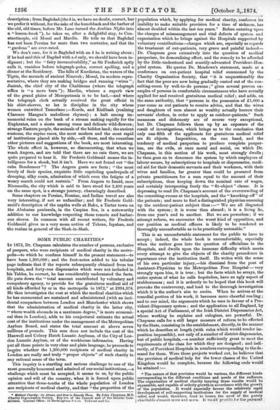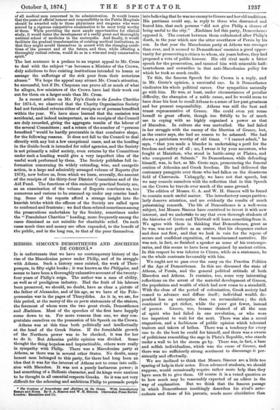SOME PUBLIC CHARITIES.* IN 1872, Dr. Chapman calculates the number
of persons, exclusive of paupers, who were recipients of medical charity in the metro- polis—to which he confines himself in the present statement—to 'have been 1,200,000; and the foot-notes added to his tabular -page indicate that if the reports subsequently obtained from ten hospitals, and forty-one dispensaries which were not included in his Tables, be correct, he has considerably understated the facts. He puts down the " total amount contributed by voluntary and compulsory agency, to provide for the gratuitous medical aid of all kinds afforded by or in the metropolis in 1872," at £994,378. He then investigates the cost at which the medical charities which he has enumerated are sustained and administered (with an inci- dental comparison between London and Manchester which shoWs that the administration of medical charity in the latter city, " where wealth abounds in a maximum degree," is more economi- cal than in London), adds to his conjectural estimate the actual cost of the institutions under the management of the Metropolitan Asylum Board, and states the total amount at above seven millions of pounds. This sum does not include the cost of the Hanwell and Colney Hatch Lunatic Asylums, of the City of Lon- don Lunatic Asylum, or of the workhouse infirmaries. Having put all these points in very clear and plain language, he proceeds to inquire whether the 1,200,000 recipients of medical charity in London are really and truly "proper objects" of such charity in any rational sense of the term.
This inquiry is a startling and serious challenge to one of the most generally honoured and admired of our social institutions,—a ehallenge which must be accepted, it seems to us, by the public opinion and will of the country, when it is forced upon public Attention that three-tenths of the whole population of London are recipients of medical charity, and that "the proportion of the
• Medical Charity: its Abuses, and how to Remedy Them, By John Chapman, BLD. Charity Organisation Society. Departs of the Council and of the District Com- mittees. Central Office: 15 Buckingham S Net. Triihner and Co.
population which, by applying for medical charity, confesses its inability to make suitable provision for a time of sickness, has almost doubled within the last ten years." Before entering upon the charges of mismanagement and vital defects of system and organisation which he brings against the Hospitals supported by voluntary contributions—charges which are, especially as regards the treatment of out-patients, very grave and painful indeed— Dr. Chapman goes extensively into the question of medical pauperism, its demoralising effect, and the remedy to be afforded by the little-understood and scantily-advocated Provident-Hos- pital system. He quotes Dr. Meadows's statement, made at a conference on out-patient hospital relief summoned by the Charity Organisation Society, that "it is unquestionably the fact that the poor are now being gradually ousted out of the con- sulting-room by well-to-do persons ;" gives several proven ex- amples of persons in comfortable circumstances who have actually applied for and received gratuitous medical relief ; and adds, on the same authority, that "persons in the possession of £1,000 a year come as out-patients to receive advice, and that the wives and daughters of men almost as wealthy actually borrow their servants' clothes, in order to apply as outdoor-patients." Such meanness and dishonesty are of course very exceptional, but Dr. Chapman follows them up by an exposure of the result of investigations, which brings us to the conclusion that only one•fifth of the applicants for gratuitous medical relief are fit objects. Imposition, on the one hand, and the tendency of medical pauperism to produce complete pauper- ism, are the evils, at once moral and social, on which Dr. Chapman, in this section of his work, most strongly dwells ; he then goes on to denounce the system by which employers of labour secure, by subscriptions to hospitals or dispensaries, medi- cal aid for their domestic servants and their workmen, with their wives and families, far greater than could be procured from private practitioners for a sum equal to the amount of their subscriptions, thus keeping down the nominal rate of wages, and certainly interpreting freely the " fit-object " clause. It is depressing to read Dr. Chapman's account of the overcrowding of the consulting-rooms at the hospitals, and the " knocking-off" of the patients ; and more to find a distinguished physician summing up the outdoor-patient subject thus :—" We are all disgusted with the system ; it is worse than absurd ; it is a living lie, from one year's end to another. But we are powerless ; if we attempt reform, we encounter the worst kind of opposition, and our position as medical officers is likely to be rendered so thoroughly uncomfortable as to be practically untenable."
This is an uncomfortable statement for the public to have to accept ; indeed, the whole book is uncomfortable, especially when the author goes into the question of officialism in the Hospitals, and dwells upon the immense difficulty which meets every attempt to give the objects of the charity precedence in mportance over the institution itself. He writes with the sense of his own particular injury,—his dismissal from the post of Assistant-Physician to the Metropolitan Free Hospital — very strongly upon him, it is true ; but the facts which he arrays, the entire system of what he calls hospitalism, have an ugly aspect of stubbornness ; and it is ardently to be hoped that this book will provoke the controversy, and lead to the thorough investigation which it is the author's aim to excite. When he arrives at the remedial portion of his work, it becomes more cheerful reading ; and to our mind, the arguments which he uses in favour of a Pro- vident-Dispensary system ; and the application to all England, by a special Act of Parliament, of the Irish District Dispensaries Act, whose working he explains and eulogises, are powerful. Dr. Chapman calls for a still larger measure of reform to be effected by the State, consisting in the establishment, directly, in the manner which he describes at length (with rules which would render im- position impossible), not only of a number of district dispensaries, but of public hospitals,—a number sufficiently great to meet the requirements of the class for which they are designed ; and indi- rectly, of Provident Hospitals in numbers corresponding to the de- mand for them. Were these projects worked out, he believes that the provision of medical help for the lower classes of the United Kingdom would be complete, because the following ends would be attained :-
" The nature of that provision would be various, the different kinds corresponding to the different conditions and needs of the sufferers. The organisation of medical charity insuring those results would be expansible, and capable of orderly growth in accordance with the growth of the population. It would especially favour the relatively rapid development of self-supporting institutions for the supply of medical relief, and would, therefore, tend to lessen the need of the purely charitable element more and more. It world pr.wila for the payment
of all medical men concerned in its administration. It would insure that the posts of official honour and responsibility in the Public Hospitals should be awarded only to those physicians and surgeons who were proved by a rigorous competitive examination to be most truly worthy of them. While providing the most ample opportunities for clinical study, it would foster the development of a really great and thoroughly national school of medicine in the metropolis. And finally, it would facilitate the gradual transformation of existing medical institutions, so that they might mould themselves in accord with the changing condi- tions of the present and of the future, and thus, while effecting a thoroughly radical reform, would do so in a wise and truly conservative
spirit."
The last sentence is a preface to an urgent appeal to Mr. Cross to deal with the subject "as becomes a Minister of the Crown, duly solicitous to free existing institutions intended to lessen or assuage the sufferings of the sick poor from their notorious abuses." We hope the appeal may attract Mr. Cross's attention, be successful, but if Dr. Chapman can prove all or much of what he alleges, few ministers of the Crown have had their work cut out for them on a larger scale than Mr. Cross.
In a recent article on Mr. Fry's Guide to the London Charities for 1874-5, we observed that the Charity Organisation Society had not furnished returns either of receipts or of persons benefited within the year. We have since learned that the omission was accidental, and indeed unimportant, as the receipts of the Council are duly recorded, giving the aggregate results of the labour of the several Committees ; and a return of the number of "persons benefited " would be hardly procurable in that conclusive shape, for the following reasons. It does not fall to the Council to deal directly with any but a few exceptional cases, and as the heading in the Guide-book is intended for relief agencies, and the Society is not primarily a relief society, even returns by the Committees under such a heading would give a very imperfect idea of the useful work performed by them. The Society publishes full in- formation concerning its widely extending, wise, and energetic action, in a large and admirably arranged volume of Reports (for 1873), now before us, from which we learn, severally, the amount of the receipts of the thirty-four District Committees and of the Aid Fund. The functions of this eminently practical Society are, as an examination of the volume of Reports convinces us, too numerous and various to be summed up under any concise head- ing. Some of the reports afford a strange insight into the knavish tricks which the officers of the Society are called upon to confound and frustrate ; we find them related sometimes among the prosecutions undertaken by the Society, sometimes under the " Fraudulent Charities " heading, more frequently among the cases dismissed as not suitable for charitable relief. On such cases much time and money are often expended, to the benefit of the public, and in the long run, to that of the poor themselves.



































 Previous page
Previous page